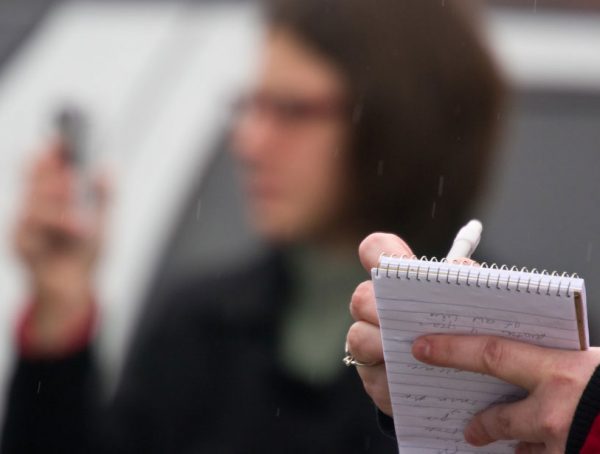The pandemic brought its share of challenges to journalists, and more than ever, their role is crucial because they are the ones who provide the public with accurate information when officials fail to do so.
Steve Riley, executive director at the Houston Chronicle, says his goal from the beginning of the pandemic has been to check the official discourse and provide accurate stories to the public.
“We geared up earlier on during the pandemic to go farther than the state was going in providing daily data, quicker data and, as it turned out, way more accurate data about the level of cases, the positive rates, and other aspects of this […] and that allowed us to do stories that showed where the state was undercounting deaths, where its positivity rate calculations were way off the mark,” says Riley.
While experts and government officials are the key actors during the pandemic, journalists’ role is to verify the information they provide. The media is now the people’s primary source of information regarding the pandemic, its evolution, and prevention. So, here are some of the topics journalists should be covering.
Reporting on numbers
Richard Berke, co-founder and executive director of STAT (a news organization reporting on health and medicine), says it is important to report the number of dead from COVID-19. However, journalists should not simply report numbers, but give readers an element for comparison.
“I remember when approaching 50.000 [deaths] we had a sort of a graphic ‘What is 50.000, how many stadiums would that fill?’ just to give people some kind of sense of understanding of what that number was,” says Berke.
Berke explains that part of a journalist’s job is to make data and facts relevant to the audience. But when the data is repeated over and over again, like the increasing number of cases, it loses its impact. For instance, the New York Times dedicated the whole front page to the coronavirus victims when the U.S. reached 100,000 deaths, but publishing a similar front page in the future would not be as effective.
“When you see these numbers every day, there’s a sort of numbing effect. The challenge is to cut through that with human stories,” explains Riley.
Reporting on minorities
The pandemic is not affecting everyone equally. Some people, especially minorities, are more susceptible to the virus than others.
“We have a history of overwhelmingly having preexisting medical conditions, so I knew this coronavirus would impact us severely — on top of the fact that I knew a lot of essential workers would most likely be Black and Brown people,” says freelance journalist Patrice Peck.
However, Peck thinks the media is not reporting on the minorities enough. As a result, she created a newsletter Coronavirus News for Black Folks that focuses on the impact the pandemic is having on the African-American communities. The newsletter attracted nearly 1,000 subscribers within the first month.
“I don’t think there is enough coverage today on school reopenings, how that’s directly impacting Black students, Black educators […]. There’s not nearly enough data on how the Black LGBT community, particularly how Black trans people have been disproportionately impacted by the coronavirus,” explains Peck.
Adding to that, she mentions the indirect effects of the pandemic that have been completely forgotten by mainstream media – economic and social consequences.
“There needs to be way more attention to this burgeoning eviction crisis that’s happening as a result of the coronavirus,” says Peck.
However, despite the overall lack of coverage, Peck says that there has been a general acknowledgment of the fact that minorities are more affected by the virus than other ethnicities.
“This is the first time in my lifetime – and I’m 32 – that I feel that the world and people this country particularly have actually paid attention to and acknowledged systemic racism in this country, and the disproportionate impact that it has on Black, Brown and […] Indigenous people in this country,” says Peck.
Keeping officials accountable
New York Times Science Correspondent Donald G. McNeil Jr. believes the watchdog role of journalists has a direct impact on the number of deaths from COVID-19.
“Thank God for the fourth estate! Thank God for journalists! Because every organ of government has been corrupted during this pandemic, and the ones we rely on to save us have been either silenced or told to tell lies. And if we did not have a free press in this country I think far more people would have died,” says McNeil.
Riley says it is difficult for journalists today to report on the crisis because public record requests take more time or cannot be obtained because offices are closed, and official sources are unreliable. The only way to get accurate information is to talk to unofficial sources off the record.
“I think our role in this pandemic has been more important than it has been in many other crises that we faced in this country because there has been such an effort to suppress the truth and fortunately we’ve been fighting that,” adds McNeil.
Finding the truth when people try to hide it is one big part of the reporter’s job today, but so is exposing the lies. Berke gave an example of one of his colleagues, reporter Helen Branswell, who held experts accountable when the discourse they served felt irrealistic.
“This was on a panel on February 11th: Helen Branswell was monitoring a panel with Anthony Fauci, who said ‘At present, given everything that’s going on, the risk is relatively low for the United States.’ […] Helen shook her head and responded: ‘Explain to me why the risk is low. Somebody, one of you panelists explain to me, because to me, when I look at the virus spreading, it’s spreading very efficiently, there is no force-field around China, it’s not going to stop there,” explains Berke.
What journalists need to report on next
With the pandemic still evolving in the U.S. and the worldwide search for a vaccine, journalists are not done covering this crisis. Berke says the next big story will be the vaccine.
“We need to report on clinical trials for a vaccine and how much people of color are participating in these trials, and also we’re going to be looking at the distribution of vaccines — when there is a vaccine — and fairness issues around that,” says Berke.
But no matter what is reported on, journalists should keep in mind a fundamental element: this pandemic is affecting everyone, no matter the social status, ethnicity, or gender. Journalists have to acknowledge the intersectionality of this crisis and speak to their audience accordingly.
“We should put ourselves in the reader’s shoes, we should put ourselves in the news consumer’s shoes even in terms of the language we use in explaining things […]. Now is not the time to speak to people who understand experts; we need to speak to the people who it might be their first time being engaged with the press, being engaged with the news […] we should keep that in mind,” says Peck.
Our experts shared their views during the SPJ 2020 Conference “Pandemic: The Stories We Told. The Stories We Missed. The Stories We Need to Tell Next” organized by The Society of Professional Journalists.








